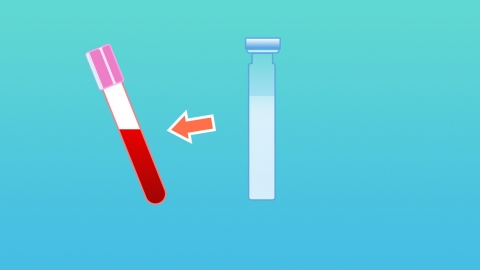What does it mean if the rapid CRP is high?
Generally, elevated levels of high-sensitivity C-reactive protein (hs-CRP) may result from conditions such as the postpartum recovery period, after intense physical exercise, or due to illnesses like acute tonsillitis, acute bronchitis, or acute cholecystitis. It is recommended to seek timely medical consultation to identify the underlying cause and receive appropriate treatment under a doctor's guidance. Detailed explanations are as follows:

1. Postpartum Recovery Period: During the postpartum period, a woman's body is in a state of stress, and the tissue repair process may cause a temporary increase in hs-CRP levels. This is usually not accompanied by other abnormal symptoms. Postpartum care should include adequate rest, sufficient sleep, and a diet rich in protein and vitamins, such as eggs, lean meat, and fresh vegetables and fruits, to promote recovery. Typically, hs-CRP levels gradually decline within one to two weeks.
2. After Intense Exercise: During high-intensity exercise, minor muscle damage and the body's stress response may cause a temporary rise in hs-CRP levels. White blood cell counts are often normal, and muscle soreness may occur. After exercise, appropriate muscle stretching, hydration with warm water and electrolytes, and avoiding intense physical activity in the short term are recommended. Resting for 3–5 days typically allows hs-CRP levels to return to normal.
3. Acute Tonsillitis: Often caused by hemolytic streptococcal infection, acute tonsillitis leads to inflamed and swollen tonsils, which can elevate hs-CRP levels due to the inflammatory response. Symptoms may include sore throat and fever. Patients may follow medical advice to use medications such as amoxicillin capsules, cefixime dispersible tablets, or Lanqin Oral Liquid to alleviate symptoms.
4. Acute Bronchitis: Bacterial infection can cause inflammation of the bronchial mucosa, leading to elevated hs-CRP levels along with symptoms such as cough and sputum production. Patients should follow medical advice and use medications such as cefuroxime axetil tablets, ambroxol hydrochloride oral solution, or azithromycin dispersible tablets for treatment.
5. Acute Cholecystitis: Obstruction of the cystic duct or bacterial infection can lead to acute gallbladder inflammation, which often causes a significant increase in hs-CRP levels, accompanied by right upper abdominal pain and nausea. Patients may follow medical instructions to use medications such as ceftriaxone sodium injection, ursodeoxycholic acid capsules, or racemic scopolamine butylbromide tablets for treatment.
In daily life, maintaining a regular routine, avoiding excessive fatigue, eating light and easily digestible foods, and reducing the intake of greasy and spicy foods are recommended. Engaging in mild physical activities such as walking or jogging can help strengthen the immune system. Additionally, monitoring physical symptoms and maintaining health awareness are important.




